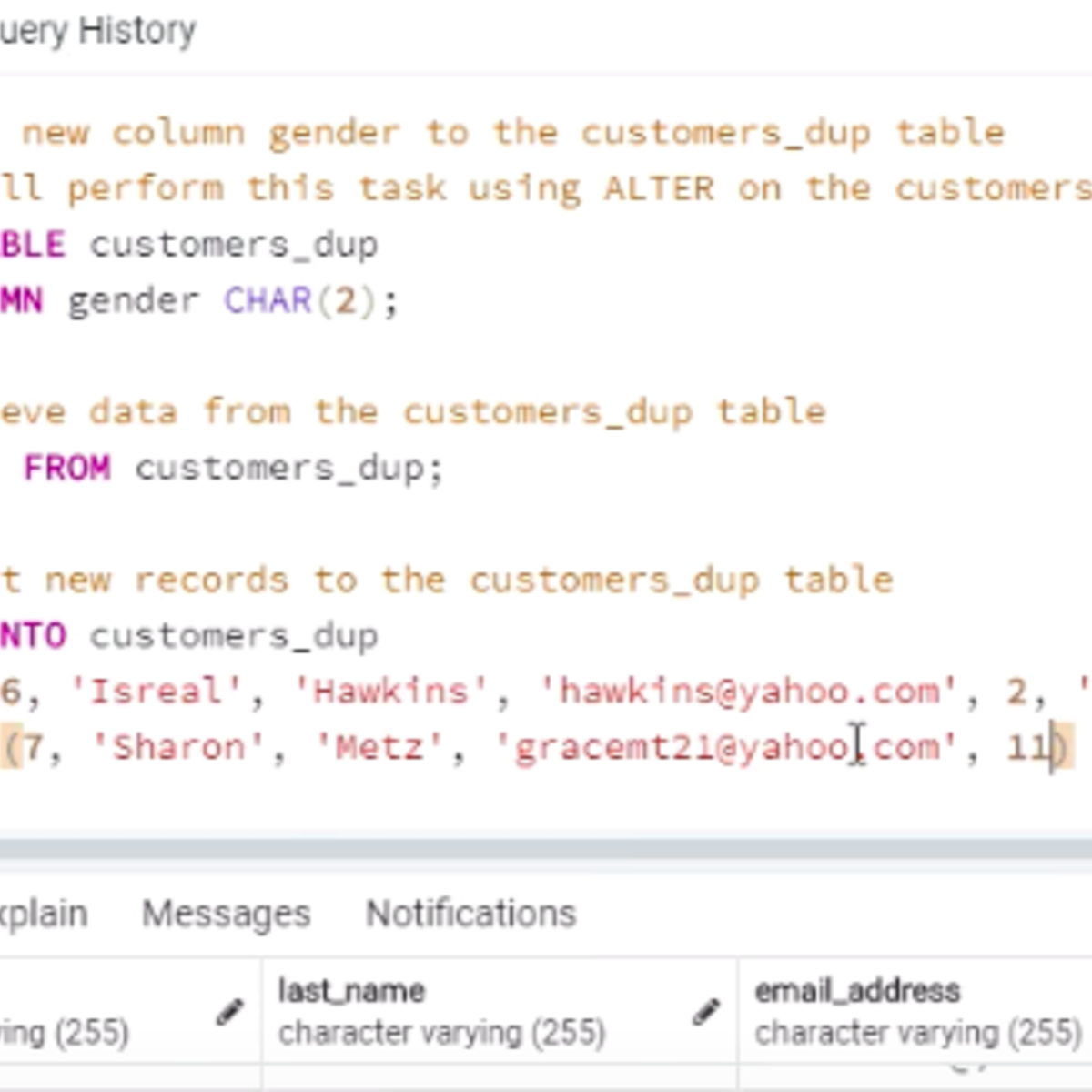
In this 2-hour long project-based course, you will learn how to use SQL data definition statements for various data definition tasks and how to use SQL data manipulation statements for data manipulation tasks such as updating records in a table. In addition, you will learn how to upload a CSV file into a database using PostgreSQL.
Three deals to help you save


What's inside
Syllabus
Good to know
Save this course
Reviews summary
Highly rated sql course
Activities
Review Relational Database Concepts
Show steps
Refresh knowledge of relational database concepts, such as data integrity, normalization, and primary/foreign keys, to strengthen understanding of SQL data definition and manipulation.
Browse courses on
Relational Databases
Show steps
-
Review concepts of relational database design
-
Practice identifying and correcting data anomalies
-
Explain the importance of database normalization
Create a Cheat Sheet of SQL Commands
Show steps
Develop a comprehensive cheat sheet that summarizes key SQL commands, syntax, and examples for quick reference during the course.
Browse courses on
SQL
Show steps
-
Gather SQL commands and syntax
-
Organize commands into categories
-
Create a visually clear and concise cheat sheet
Design and Create a Database
Show steps
Develop a project plan for designing and creating a database using SQL, ensuring that the database meets the specified requirements.
Browse courses on
Data Definition
Show steps
-
Gather requirements and define database purpose
-
Create entity-relationship diagram
-
Design database schema
-
Create database and tables
Three other activities
Expand to see all activities and additional details
Show all six activities
Participate in SQL Study Group
Show steps
Collaborate with peers to discuss SQL concepts, work on exercises together, and share knowledge to improve understanding and retention.
Browse courses on
SQL
Show steps
-
Join or form a study group with other students
-
Meet regularly to discuss course material
-
Work together to solve SQL problems
SQL Data Manipulation Exercises
Show steps
Reinforce understanding of SQL data manipulation concepts by practicing writing and executing queries to retrieve, update, and delete data.
Browse courses on
SQL
Show steps
-
Write queries to insert, update, and delete records
-
Use SQL functions to manipulate data
-
Practice writing complex queries using joins and subqueries
Follow Tutorials on Advanced SQL Techniques
Show steps
Expand skills in SQL data manipulation and analysis by following guided tutorials that cover topics such as window functions, common table expressions, and data visualization.
Browse courses on
SQL
Show steps
-
Find tutorials on advanced SQL techniques
-
Follow tutorials and complete exercises
-
Apply techniques to real-world data sets
Review Relational Database Concepts
Show steps
Refresh knowledge of relational database concepts, such as data integrity, normalization, and primary/foreign keys, to strengthen understanding of SQL data definition and manipulation.
Browse courses on
Relational Databases
Show steps
- Review concepts of relational database design
- Practice identifying and correcting data anomalies
- Explain the importance of database normalization
Create a Cheat Sheet of SQL Commands
Show steps
Develop a comprehensive cheat sheet that summarizes key SQL commands, syntax, and examples for quick reference during the course.
Browse courses on
SQL
Show steps
- Gather SQL commands and syntax
- Organize commands into categories
- Create a visually clear and concise cheat sheet
Design and Create a Database
Show steps
Develop a project plan for designing and creating a database using SQL, ensuring that the database meets the specified requirements.
Browse courses on
Data Definition
Show steps
- Gather requirements and define database purpose
- Create entity-relationship diagram
- Design database schema
- Create database and tables
Participate in SQL Study Group
Show steps
Collaborate with peers to discuss SQL concepts, work on exercises together, and share knowledge to improve understanding and retention.
Browse courses on
SQL
Show steps
- Join or form a study group with other students
- Meet regularly to discuss course material
- Work together to solve SQL problems
SQL Data Manipulation Exercises
Show steps
Reinforce understanding of SQL data manipulation concepts by practicing writing and executing queries to retrieve, update, and delete data.
Browse courses on
SQL
Show steps
- Write queries to insert, update, and delete records
- Use SQL functions to manipulate data
- Practice writing complex queries using joins and subqueries
Follow Tutorials on Advanced SQL Techniques
Show steps
Expand skills in SQL data manipulation and analysis by following guided tutorials that cover topics such as window functions, common table expressions, and data visualization.
Browse courses on
SQL
Show steps
- Find tutorials on advanced SQL techniques
- Follow tutorials and complete exercises
- Apply techniques to real-world data sets
Career center
Data Analyst
Database Administrator
Data Scientist
Software Engineer
Business Analyst
Information Security Analyst
Data Engineer
Machine Learning Engineer
Statistician
Actuary
Financial Analyst
Market Researcher
Operations Research Analyst
Quantitative Analyst
Risk Analyst
Reading list
Share
Similar courses
OpenCourser helps millions of learners each year. People visit us to learn workspace skills, ace their exams, and nurture their curiosity.
Our extensive catalog contains over 50,000 courses and twice as many books. Browse by search, by topic, or even by career interests. We'll match you to the right resources quickly.
Find this site helpful? Tell a friend about us.
We're supported by our community of learners. When you purchase or subscribe to courses and programs or purchase books, we may earn a commission from our partners.
Your purchases help us maintain our catalog and keep our servers humming without ads.
Thank you for supporting OpenCourser.


